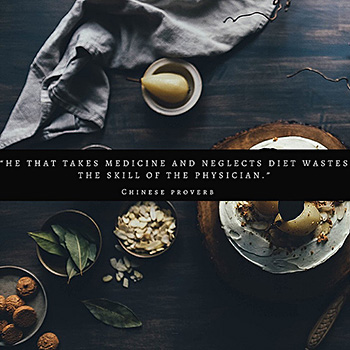What does Chinese Medicine have to say about food and diet? How does Chinese Medicine view our digestive system?
“Their eating and drinking was moderate. Their rising and resting had regularity. They did not tax themselves with meaningless work.”
~Huang Di Nei Jing Ch. 1
“He that takes medicine and neglects diet wastes the skills of the physician.”
~Chinese proverb
Food, diet and exercise all can be a difficult subject for some people. Our relationship with food can be tricky and even unhealthy when we give in to our cravings. Most of the time, food and the act of eating is an enjoyable experience. It is also how we spend time with our families and there are certain food traditions that have a deeper meaning in our diverse cultures!
(It is certainly my favorite way to interact with people…ha). However, there is a saying in Chinese Medicine where we have “everything in moderation.” Of course our interpretation of “moderation” can vary but that is the general rule.
Unfortunately, the most “delicious” foods in Western culture is often packed with tons of salt, sugar, cream or additives that damage us over time (as much as we’d like to deny it). We all kind of relate to always wanting “one more cookie” or “one more slice of pizza” that sometimes pushes us over the edge. Then afterwards we feel guilty for giving into our cravings that make us want to go on a special “de-tox” cleansing diet that only lasts temporarily.
The key to having a healthy digestive system lies in the function of the so called “gut.” Western medicine have now realized how important the gut flora and how it relates to the functioning of the mind. Chinese medicine has always know that “you are what you eat” or more accurately you are “what you digest and absorb” (Goldsmith & Klein, 2017). A practitioner of Chinese Medicine considers how digestive imbalances can influence various physical, mental and emotional issues. It is another reminder of how Chinese Medicine integrates the mind-body connection when considering a diagnosis.
In Chinese Medicine, the spleen and stomach work as a unit for digestive function. Try not to view this from a Western medicine perspective, but as another way to view our bodies. This is a completely different system that has worked for over thousands of years and still embody the essence of Chinese culture of how they eat their food.
Spleen/Stomach – the element associated with it is Earth. It is the center of all the other elements of the body (fire, metal, water and spring) and also it is the center of our bodies in a way. The Spleen and Stomach are a “pairing” in the digestive process. This is an explanation of both the functions of the spleen and stomach from a Chinese medicine perspective.
STOMACH FUNCTION: Chinese medicine always like to have metaphors to explain physiological processes. They think about the stomach as being a “cooking pot” where the stomach’s role is the breakdown food/digest food so it can send it down to be processed by the small intestine. This is the “digestive fire” – so all the stomach acid and fluids that help digest foods. The strength of this digestive fire is dependent upon the temperature of the internal climate that is neither too cold or too hot.
Another thing that we should know – Foods have an inherent temperature about them. If we think about this, it kind of makes sense. Cold foods are include ice-cream, raw salads, raw vegetables, seafood, fruits and yogurts. Think about what we crave during the summer-time, we want something cooling for our bodies right? Cold foods straight from the refrigerator are also cold in thermal nature that can weaken digestive fire and injure the spleen’s capacity to transform and transport nourishment. It slows down the digestive function of the digestive “fire” of the stomach. Also really spicy foods or overconsumption of hot/spicy foods can dry up digestive fluids in the stomach.
Deficient stomach qi (digestive fire) can include: low appetite, stomach discomfort, a feeling of whole-body weakness, loose stools or indigestion
Excessive stomach heat can include: stomach pain, constipation, desire to drink cold liquids, dry mouth and lips, and extreme thirst
SPLEEN FUNCTION: the spleen assists the stomach in the process of digestion and it is the prime distributor of nutrients throughout the body. The spleen is what helps extract nutrients/nourishment from food to turn into the energy and blood that runs through our entire body. So “we are what we eat” plays an essential role to the spleen’s function. It takes the food that we ingest and turns it into something we can use!
So, the spleen likes a certain environment. The spleen enjoys a dry and warm environment in contrast to the stomach which likes a moist environment. The excessive intake of cold, iced or creamy, rich and fatty will impede and weaken its function
Weakened Spleen qi symptoms: fatigue, feeling of heaviness in the limbs, inability to focus or concentrate, or conditions of excessive phlegm or mucus. → when the spleen cannot effectively transform and transport nourishment then things start to “clog” up. So this is where phlegm, fat, mucus and stagnation occur throughout the body.
Here are some ideas of beneficial foods for our spleen/stomach system! The spleen/stomach network requires a balance of certain foods and lifestyle habits! Here’s a list of some foods we can all try to incorporate in our daily lives. These foods are mostly “neutral” in their thermal nature or “warm” (Goldsmith & Klein, 2017).
- Whole grains: oats, buckwheat, sweet glutinous brown rice
- Beans, legumes: chickpeas, adzuki beans, peas
- Vegetables: all winter squashes, carrots, cabbages, peas, fennel, pumpkin, sweet potatoes or yams, mushrooms, green beans, lotus root
- Nuts and seeds: chestnuts, almonds
- Animal foods: all broths of beef and chicken, eggs, trout, salmon, beef, chicken, pork
- Fruits: red dates, sweet cherries
- Beverages/teas: ginger tea, licorice tea, ginger and tangerine peel tea
- Culinary herbs: rosemary, thyme, chives, vanilla
Other foods to consider when trying to lose weight and promote digestion:
- Salmon/trout
- Bitter greens: dandelion, escarole, chicory, and romaine lettuce to help clear dampness
- Pungent foods: turnips, radishes, ginger root, citrus peel, cardamom, nutmeg, vanilla, anise, rosemary, thyme
- Vinegar also helps stimulate digestion – include that in some cooking you do
- Seaweeds, carrots, cabbage, fennel, sweet potatoes (help you with the sweet cravings, I like to add coconut oil and cinnamon..tastes like a dessert!), winter squash and pumpkin
Detrimental Foods for the Stomach and Spleen
- Too many iced drinks, foods straight out of the refrigerator, too many raw fruits or salads (especially during the winter)
- Too many creamy and greasy foods – excess of dairy products such as yogurt, ice cream, cottage cheese, milk products.
- Hot and spicy foods (a little bit is fine)
- Too much sugar and too many sweet foods
- Too much coffee or hard liquor
- Excess of grilled foods
- Regular consumption of deep-fried foods → these are considered “dampening” foods
These are just some ideas of what kinds of food we can all incorporate into our lives! The next time I can talk about what kinds of foods they like to eat during each season. Chinese Medicine observed all the seasons and found what made the most sense in terms of what to eat during those changes.
References
Goldsmith, E., & Klein, M. (2017). Nutritional Healing with Chinese Medicine. Ontario: Robert Rose Inc.






